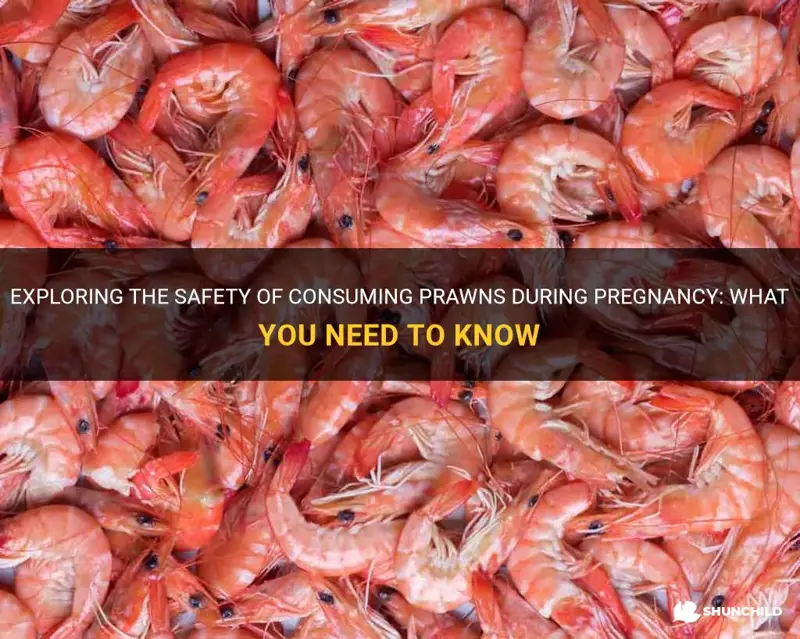
Pregnancy is an incredible and transformative time for women, as they nurture and care for a growing life within them. However, this beautiful journey can also raise many questions and concerns about what is safe and beneficial for both the mother and the baby. One such question often asked is whether it is safe to consume prawns during pregnancy. Prawns are a delicious and popular seafood choice, packed with essential nutrients. In this article, we will explore the benefits and potential risks of consuming prawns during pregnancy, providing you with the information you need to make an informed decision about including them in your diet.
| Characteristics | Values |
|---|---|
| Nutritional Benefits | Prawns are a good source of protein, omega-3 fatty acids, and essential minerals like zinc and selenium. |
| Omega-3 Fatty Acids | Prawns contain omega-3 fatty acids, which are important for fetal brain and eye development. |
| Protein Content | Prawns are a good source of protein, which is crucial for the growth and development of the baby. |
| Zinc | Prawns are rich in zinc, which is important for the immune system and overall growth and development. |
| Selenium | Prawns are a good source of selenium, an essential mineral that supports thyroid function and helps protect against oxidative stress. |
| Mercury Content | Prawns have a low mercury content compared to certain other seafood, making them a safer choice during pregnancy. |
| Potential Allergen | Prawns can be an allergenic food, so it's important to be cautious if you have a known allergy or family history of allergies. |
| Cooking Precautions | It is essential to ensure that prawns are cooked thoroughly to reduce the risk of bacterial contamination. |
| Hygiene and Freshness | It is crucial to select fresh prawns from a reputable source and maintain proper hygiene while handling and preparing them. |
| Moderation | While prawns can be a part of a healthy pregnancy diet, it's important to consume them in moderation and maintain a balanced diet overall. |
What You'll Learn
- Is it safe to consume prawns during pregnancy?
- Are there any benefits to eating prawns while pregnant?
- Are there any potential risks or concerns with eating prawns during pregnancy?
- How much prawns can be safely consumed during pregnancy?
- Are there any guidelines or recommendations for preparing and cooking prawns during pregnancy to ensure safety?

Is it safe to consume prawns during pregnancy?
Pregnancy is a time when women often have many questions about what is safe to eat and what should be avoided. One food that often comes up for debate is prawns. For many pregnant women, prawns are a popular choice due to their delicious taste and nutritional benefits. However, concerns have been raised about the potential risks associated with consuming prawns during pregnancy. In this article, we will explore the topic to provide you with an informed answer to the question: Is it safe to consume prawns during pregnancy?
Scientific research:
One way to answer this question is by looking at scientific research. Several studies have been conducted to determine the safety of consuming prawns during pregnancy. A study published in the Journal of Food and Chemical Toxicology found that prawns are safe for consumption during pregnancy when cooked thoroughly. The study concluded that prawns are a good source of protein, omega-3 fatty acids, and various vitamins and minerals, which can be beneficial for both the mother and the developing fetus.
Experience of pregnant women:
Another way to gain insight into the safety of consuming prawns during pregnancy is by considering the experiences of pregnant women. Many women have consumed prawns throughout their pregnancies without any adverse effects. They have reported enjoying prawns as a part of their regular diet and have not experienced any problems.
Step-by-step guidelines:
To ensure the safety of consuming prawns during pregnancy, it is important to follow specific guidelines:
- Choose fresh prawns: Make sure to purchase fresh prawns from a reputable source. Avoid prawns that have an off smell or slimy texture, as this could indicate spoilage.
- Cook thoroughly: Cooking prawns thoroughly is crucial to kill any harmful bacteria or parasites that may be present. Ensure that the prawns are properly cooked until they turn pink and have a firm texture.
- Avoid raw or undercooked prawns: It is advisable to avoid raw or undercooked prawns during pregnancy, as they can pose a higher risk of foodborne illnesses such as salmonella or listeria.
- Balance your diet: While prawns can be a healthy addition to a pregnancy diet, it is important to maintain a balanced intake of other nutrients as well. Include a variety of fruits, vegetables, whole grains, and lean proteins to ensure a well-rounded diet.
Examples:
Prawns can be a nutritious addition to a pregnancy diet. They are a good source of protein, which is essential for the growth and development of the baby. Prawns also contain omega-3 fatty acids, which are important for brain and eye development. Additionally, they are rich in vitamins and minerals such as vitamin B12, iron, and zinc, which are necessary for overall maternal health during pregnancy.
In conclusion, consuming prawns during pregnancy is generally safe when cooked thoroughly and consumed in moderation. They offer various nutritional benefits and can be a delicious and nutritious addition to a pregnancy diet. However, it is always advisable to consult with a healthcare professional before making any significant changes to your diet during pregnancy.
Exploring the Ethical and Practical Considerations of Aborting Cat Pregnancy
You may want to see also

Are there any benefits to eating prawns while pregnant?
Pregnancy is a time when women need to be cautious about what they eat to ensure the health of both themselves and their growing baby. One food that often causes confusion among pregnant women is prawns. There is a lot of debate about whether or not it is safe to eat prawns during pregnancy. However, when consumed in moderation and following proper guidelines, prawns can actually provide several benefits to pregnant women.
Prawns are a good source of lean protein, which is essential for the development of the baby's organs, muscles, and tissues. Protein is also important for the mother's overall health and well-being during pregnancy. It can help with the repair and growth of tissues, as well as ensure a healthy weight gain.
In addition to being a good source of protein, prawns also contain essential nutrients such as omega-3 fatty acids, vitamin D, and vitamin B12. Omega-3 fatty acids are important for the development of the baby's brain and nervous system. They can also help reduce the risk of preterm labor and improve the baby's cognitive development.
Vitamin D is crucial for bone health, as it helps the body absorb and use calcium effectively. Pregnant women have an increased need for vitamin D to support the development of their baby's skeleton. Vitamin B12 is essential for cell division and the formation of red blood cells. It plays a crucial role in preventing anemia, which is a common condition during pregnancy.
However, it is important to note that there are certain precautions that pregnant women need to take when consuming prawns. It is recommended to avoid raw or undercooked prawns, as they may contain harmful bacteria or parasites that can cause foodborne illnesses. Pregnant women should always ensure that the prawns are cooked thoroughly, reaching an internal temperature of 145°F (63°C).
Furthermore, some pregnant women may be allergic to shellfish, including prawns. If you have a known shellfish allergy or have experienced an allergic reaction in the past, it is advisable to avoid prawns altogether during pregnancy.
When it comes to choosing prawns, it is best to opt for wild-caught and sustainably sourced varieties. This ensures that the prawns are free from harmful contaminants and have been harvested in an environmentally friendly manner.
In conclusion, consuming prawns in moderation and following proper guidelines can provide several benefits to pregnant women. They are a good source of lean protein and contain essential nutrients such as omega-3 fatty acids, vitamin D, and vitamin B12. However, pregnant women should be cautious and ensure that prawns are cooked thoroughly to avoid the risk of foodborne illnesses. It is also important to note any allergies or sensitivities to shellfish. As always, it is best to consult with a healthcare professional before making any dietary changes during pregnancy.
Signs of Normal Pregnancy Discharge: What to Expect
You may want to see also

Are there any potential risks or concerns with eating prawns during pregnancy?
Pregnancy is a time when women need to be extra cautious about what they eat, as certain foods can pose a risk to both the mother and the baby. Prawns, being a popular seafood choice, are often a concern for pregnant women due to potential risks associated with their consumption. In this article, we will explore whether there are any real risks or concerns with eating prawns during pregnancy.
First and foremost, it is important to note that prawns are a rich source of high-quality protein, omega-3 fatty acids, vitamins, and minerals. These nutrients are essential for the growth and development of the baby, as well as for the overall health of the mother. However, there are a few factors to consider when consuming prawns during pregnancy.
One concern with eating prawns during pregnancy is the potential presence of harmful bacteria or viruses, such as Listeria or Salmonella. These pathogens can cause foodborne illnesses that can be particularly dangerous for pregnant women, as they can lead to miscarriage, premature birth, or infections in the baby. Therefore, it is crucial to ensure that the prawns are fresh, properly cooked, and stored at the correct temperature to minimize the risk of contamination.
To ensure the safety of prawns during pregnancy, it is recommended to follow a few guidelines. Firstly, always buy prawns from a reputable source and check for signs of freshness, such as a mild ocean smell and firm texture. Secondly, store them in the refrigerator at a temperature below 40°F (4°C) and consume them within a day or two. If frozen prawns are being used, be sure to thaw them properly in the refrigerator before cooking.
When it comes to cooking prawns during pregnancy, it is important to ensure that they are thoroughly cooked. Heat destroys bacteria and viruses, significantly reducing the risk of foodborne illnesses. Prawns should be cooked until they turn pink and opaque, and the internal temperature reaches 145°F (63°C) to ensure they are safe to consume.
Another potential concern with prawns during pregnancy is the level of mercury they may contain. Mercury is a toxic metal that can be found in some seafood, particularly large predatory fish. High levels of mercury can harm the developing nervous system of the baby. However, prawns are considered a low-mercury seafood option, making them safe for consumption during pregnancy. Nevertheless, it is always a good idea to consume prawns in moderation and vary the types of seafood consumed to reduce exposure to any potential contaminants.
In conclusion, while there are some potential risks associated with eating prawns during pregnancy, proper handling, cooking, and moderation can help minimize these risks. Prawns can be a nutritious addition to a pregnant woman's diet when consumed responsibly. However, it is essential for pregnant women to consult with their healthcare provider before making any significant changes to their diet to ensure the health and well-being of both the mother and the baby.
The Benefits of Using a Gym Ball During Pregnancy
You may want to see also

How much prawns can be safely consumed during pregnancy?
Pregnancy is a special time in a woman's life, where she needs to pay extra attention to her diet. Many expectant mothers wonder about the safety of consuming certain foods during pregnancy, including seafood like prawns. Prawns are a type of shellfish that are widely enjoyed around the world. They are known for their tasty flavor and are often used in various cuisines.
When it comes to consuming prawns during pregnancy, there are a few important factors to consider. First and foremost, it's crucial to ensure that the prawns are fresh and properly cooked to reduce the risk of bacterial contamination. Raw or undercooked prawns can contain harmful bacteria or parasites that may pose a risk to both the mother and the baby.
According to the Food and Drug Administration (FDA), pregnant women can safely consume prawns as long as they are cooked to an internal temperature of 145°F (63°C). Proper cooking kills off any potential pathogens, making the prawns safe to eat. It is recommended to avoid eating prawns that are still translucent and opt for ones that have turned opaque and firm when cooked.
Prawns are a good source of protein and other essential nutrients, such as omega-3 fatty acids, which are important for the development of the baby's brain and eyes. Consuming prawns in moderation can provide these beneficial nutrients, but it is important not to overindulge. Like any other food, excessive consumption can lead to an imbalance in the diet.
The American Pregnancy Association recommends that pregnant women aim for a balanced diet that includes a variety of foods from different food groups. This ensures that the body gets all the necessary nutrients for a healthy pregnancy. Therefore, prawns should be consumed in moderation as part of a well-rounded diet that includes a variety of fruits, vegetables, whole grains, and other sources of protein.
It is always a good idea to consult with a healthcare professional or a registered dietitian before making any significant changes to your diet during pregnancy. They can provide personalized advice and help you determine the appropriate portion size and frequency of consuming prawns based on your specific needs and health condition.
In conclusion, prawns can be safely consumed during pregnancy when they are fresh and properly cooked. It is important to avoid raw or undercooked prawns due to the potential risk of foodborne illnesses. Consuming prawns in moderation as part of a balanced diet can provide essential nutrients for both the mother and the baby. If you have any concerns or questions, it is best to consult with a medical professional for personalized advice.
Is it Possible for the Baby to Hide During Pregnancy?
You may want to see also

Are there any guidelines or recommendations for preparing and cooking prawns during pregnancy to ensure safety?
Pregnancy is a period when the health and well-being of both the mother and the developing baby are of utmost importance. It is essential to take extra precautions in terms of food safety to avoid any potential risks. When it comes to consuming prawns during pregnancy, there are some guidelines and recommendations you should follow to ensure their safety.
Choose Fresh and High-Quality Prawns:
When purchasing prawns, make sure to choose fresh and high-quality ones. Look for prawns that have a fresh smell, firm texture, and clear eyes. Avoid those that have a strong fishy smell or appear slimy, as these may indicate spoilage. It is also advisable to buy prawns from a trusted source, such as a reputable grocery store or fishmonger.
Clean and Devein the Prawns Properly:
Before cooking the prawns, it is crucial to clean and devein them properly. Rinse the prawns under cold running water to remove any dirt or sand. After rinsing, use a sharp knife to make a shallow incision along the back of the prawn and remove the dark vein that runs along it. This vein may carry bacteria or contaminants, and removing it reduces the risk of any potential harm.
Cook the Prawns Thoroughly:
To ensure the safety of prawns during pregnancy, it is essential to cook them thoroughly. Cooking prawns properly helps eliminate any harmful bacteria or parasites that may be present. The prawns should turn pink or opaque when cooked and should reach an internal temperature of at least 145°F (63°C). Avoid eating raw or undercooked prawns, as they may pose a risk of foodborne illnesses.
Avoid Cross-Contamination:
To prevent cross-contamination, ensure that you separate raw prawns from other food items in your kitchen. Use separate cutting boards, utensils, and plates for raw and cooked prawns. Wash your hands thoroughly with soap and warm water after handling raw prawns to reduce the risk of spreading any potential bacteria.
Refrigerate Leftover Prawns Promptly:
If you have cooked prawns left over, it is essential to refrigerate them promptly. Storing them at temperatures below 40°F (4°C) helps prevent bacterial growth. It is advisable to consume the leftovers within 2-3 days to maintain their freshness and quality.
Listen to Your Body:
Every pregnancy is unique, and individual sensitivities to certain foods can vary. If you have any concerns or experience any discomfort after consuming prawns, it is advisable to consult your healthcare provider. They can provide personalized advice based on your specific situation and medical history.
In conclusion, with proper handling, preparation, and cooking, prawns can be safely consumed during pregnancy. By following the guidelines and recommendations mentioned above, you can enjoy prawns as part of a healthy and balanced diet while ensuring the well-being of both you and your baby. Remember to always prioritize food safety and make choices that promote a healthy pregnancy.
Exploring the Safety of Consuming Nannari During Pregnancy: What You Need to Know
You may want to see also







